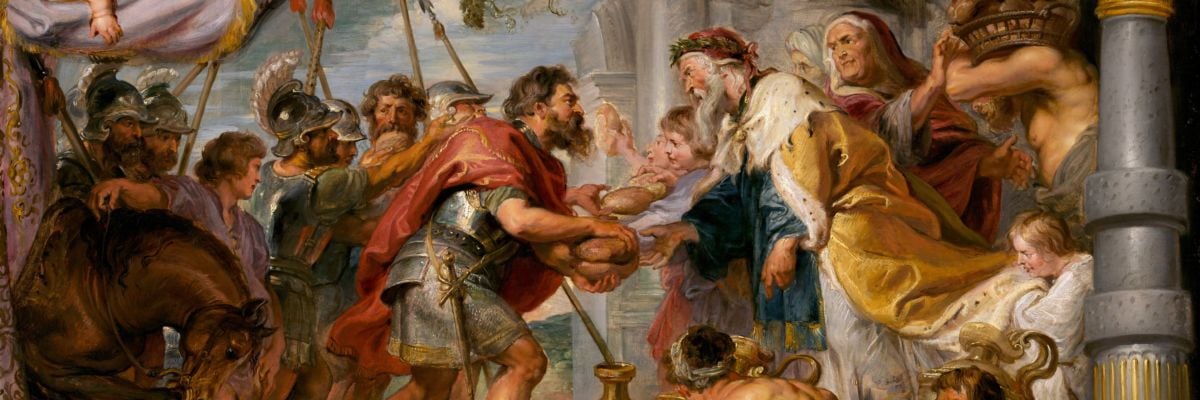
Who is Melchizedek, the mysterious figure mentioned in the Bible? In this excerpt from Catholic Answers Live, Joe Heschmeyer explores the significance of Melchizedek in both the Old and New Testaments. He discusses Melchizedek’s unique priesthood, his connection to Jesus Christ, and the symbolism surrounding his encounters with Abraham.
Transcript:
I came in this church about four years ago and in some passages in the Bible, for example, the 110 Psalm, there’s a phrase in there and I’ve seen it in a few other places in the Bible that says, “Was a priest like Macalzadek of old?”
And I’m wondering, who was Macalzadek and why is he being referenced in the Bible and scriptures?
Oh, thank you, Ken. I love that question, Ken. And first of all, welcome home. I get to call you a little brother in the faith because Evelyn, you’re a four-year-old. So it’s good to be here. Welcome home, little brother. Yeah.
Second, if you want a good… The first time…
Hey, let me start by saying this. Melchizedek is super mysterious and that’s one of the reasons the biblical authors are drawn to him. You’ve got Genesis 14. Abraham, then Abraham is doing his thing and he’s fighting rival kings and he wins a battle. And then we’re told that Melchizedek, the king of Salem, now Salem means peace, brought out bread and wine. He was priest of God Most High. So he’s not a pagan priest. He’s a true priest of the God of Abraham.
He’s described as both a priest and a king. He’s the king of peace.
And then he blesses Abraham and says, “Blessed be Abraham by God Most High, maker of heaven and earth, and blessed be God Most High, who has delivered your enemies into your hand.”
And so this is already pretty strange. What is he doing blessing Abraham or Abraham? And then Abraham ties to him a tenth of everything he has.
And so that’s the starting point. That’s how we’re introduced to Melchizedek.
And then in the Psalms, we’re promised that the Messiah is going to be a priest like Melchizedek of old. What does it mean to say a priest like Melchizedek of old? The Jewish priesthood hadn’t been inaugurated yet. The Jewish priesthood is of the line of Aaron and it was a blood lineage. If your father was a priest, you were a priest under the Levitical tribe, the sons of Aaron.
In the case of the Messiah, he’s not going to be like that. He’s going to be like Melchizedek where he is a priest, but he doesn’t have his priesthood from an earthly authority like this blood lineage from Aaron. He’ll be a priest like Melchizedek of old. And Jesus has this. He is not one of the sons of Levi in terms of the genealogy we’re presented in the Bible.
He is a priest like Melchizedek of old. And so it’s not an earthly priesthood. It’s a heavenly one. And so Hebrews 7 talks about this specifically and points out how weird these different features are. And that Levi is actually a descendant of Abraham. So the fact that Abraham, the ancestor and forerunner of Levi, the founders of the Levitical priesthood, or the Levites from which the Levitical priesthood comes, the fact that he is tithing to Melchizedek shows that Melchizedek is superior to Abraham.
The greater blesses the lesser. So the fact that Melchizedek is blessing Abraham shows he is Abraham superior in some sense. The fact that Abraham is tithing to him shows the same thing.
And so whoever this mysterious figure is without a genealogy, without a lineage, without, I mean, all we’re told is he’s king of peace. He has no lineage. There’s something extremely Christ-like in this presentation of Melchizedek. And this is something that, again, I would point you to Hebrews 5, 6, and 7, especially Hebrews 7, focuses on this a lot, that this is fulfilled in Christ, that all of this is ultimately pointing to Jesus, who is the true king of priests, the true king of peace and our high priest, and the one to whom Abraham himself worships as God.
Hey, thanks for watching. If you like this Catholic answer, be sure to like, subscribe, and check out our live streams Monday through Friday, 3 to 5 p.m. Pacific, or find the episode after on YouTube, your favorite podcast platform, or our Catholic Answers app.



